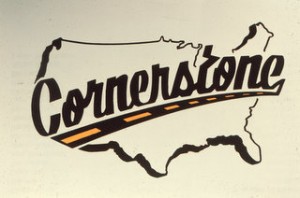Where Social History and Theater Converge
 A few weeks ago the New York Times featured an article on American Revolutions: The United States History Cycle, a new initiative by the Oregon Shakespeare Festival to commission original plays that address the big themes of U.S. history. Reading it turned my thoughts immediately toward Cornerstone Theater Company. OSF’s Artistic Director is Bill Rauch, who as a fresh-faced college graduate in 1986 helped to found Cornerstone. As a young arts administrator who eventually ended up a public historian, I was enthralled with Cornerstone. The dozen or so Cornerstone company members travelled the country to rural communities, where they worked with locals to transform theatrical classics, creating such memorable, thoroughly local shows as an interracial Romeo and Juliet in Port Gibson, Mississippi; Three Sisters from West Virginia in Montgomery, West Virginia; and The Marmarth Hamlet in Marmarth, North Dakota. (See this complete timeline of Cornerstone’s productions.)
A few weeks ago the New York Times featured an article on American Revolutions: The United States History Cycle, a new initiative by the Oregon Shakespeare Festival to commission original plays that address the big themes of U.S. history. Reading it turned my thoughts immediately toward Cornerstone Theater Company. OSF’s Artistic Director is Bill Rauch, who as a fresh-faced college graduate in 1986 helped to found Cornerstone. As a young arts administrator who eventually ended up a public historian, I was enthralled with Cornerstone. The dozen or so Cornerstone company members travelled the country to rural communities, where they worked with locals to transform theatrical classics, creating such memorable, thoroughly local shows as an interracial Romeo and Juliet in Port Gibson, Mississippi; Three Sisters from West Virginia in Montgomery, West Virginia; and The Marmarth Hamlet in Marmarth, North Dakota. (See this complete timeline of Cornerstone’s productions.)
After six years, Cornerstone left the backroads and settled in Los Angeles, where the company continues to mount projects that bring together professional theater artists and local communities. Other arts institutions talk the talk and make well-meaning gestures toward community outreach; Cornerstone has always been the real deal.
Rauch is clearly trying to bring some of Cornerstone’s ethos into the much larger, more traditional institutional setting that is OSF, and no one can accuse him of lacking ambition in seeking to emulate Shakespeare’s history cycle. According to project director Alison Carey (who co-founded Cornerstone with Rauch), “If these plays can be part of a conversation about who we are, so that we can create a shared vocabulary and a shared understanding of even broadly defined values and goals, how much easier will it be to move forward? We have so many decisions to make that are being stymied by a very confusing and fractured discourse.”
Any program that supports the creation of new plays is a worthy one, but OSF’s attempt to birth 37 U.S. history plays over ten years seems more admirable than effective when it comes to the goal of stimulating “a conversation about who we are.” The first two shows to be commissioned cover contemporary conflicts over illegal immigration and the 1978 assassination of San Francisco mayor George Moscone; next in line is a play about Lyndon B. Johnson’s early presidency, leading up to passage of the Civil Rights Act of 1964. Not exactly the most difficult historical subjects to make meaningful to contemporary theater audiences. Will OSF’s impressive roster of playwrights tackle the further reaches of U.S. history or stay in the relatively more comfortable zone of the recent past? And even if their historical range expands, how much influence can any play wield over political discourse in an age when very few Americans attend live theater, and those who do are for the most part affluent and well educated? With any luck, one of their commissions will turn into a classic and become lodged on English class reading lists (think The Crucible), or be turned into a Hollywood film. In the end, I’d rather see the kind of energy and funding that OSF is generating for The United States History Cycle be spent on a widespread effort to bring Cornerstone-style community theater to more communities across the country. That’s where theater artists should have the support they need to bring about an American conversation that will matter.
Last 5 posts by Ellen Noonan
- Five Years - October 11th, 2012
- Patriotic Celebrations - July 4th, 2012


